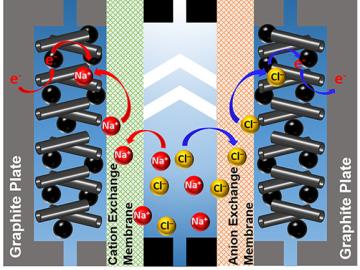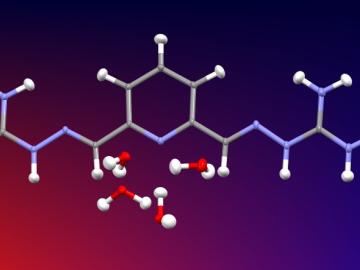
Filter News
Area of Research
- Advanced Manufacturing (2)
- Biological Systems (1)
- Biology and Environment (57)
- Building Technologies (1)
- Computational Biology (1)
- Computational Engineering (3)
- Computer Science (12)
- Energy Science (59)
- Fusion and Fission (17)
- Fusion Energy (9)
- Isotopes (19)
- Materials (57)
- Materials for Computing (7)
- Mathematics (1)
- National Security (23)
- Neutron Science (73)
- Nuclear Science and Technology (11)
- Quantum information Science (4)
- Supercomputing (59)
News Type
News Topics
- (-) Big Data (37)
- (-) Bioenergy (65)
- (-) Biomedical (41)
- (-) Clean Water (23)
- (-) Computer Science (119)
- (-) Cybersecurity (26)
- (-) Fusion (35)
- (-) Isotopes (38)
- (-) Neutron Science (91)
- (-) Partnerships (35)
- 3-D Printing/Advanced Manufacturing (95)
- Advanced Reactors (27)
- Artificial Intelligence (60)
- Biology (74)
- Biotechnology (21)
- Buildings (46)
- Chemical Sciences (57)
- Composites (26)
- Coronavirus (34)
- Critical Materials (25)
- Education (3)
- Element Discovery (1)
- Emergency (1)
- Energy Storage (88)
- Environment (126)
- Exascale Computing (17)
- Fossil Energy (2)
- Frontier (20)
- Grid (45)
- High-Performance Computing (55)
- Hydropower (8)
- Irradiation (2)
- ITER (6)
- Machine Learning (37)
- Materials (105)
- Materials Science (105)
- Mathematics (8)
- Mercury (9)
- Microelectronics (1)
- Microscopy (39)
- Molten Salt (8)
- Nanotechnology (47)
- National Security (38)
- Nuclear Energy (63)
- Physics (46)
- Polymers (28)
- Quantum Computing (19)
- Quantum Science (48)
- Security (20)
- Simulation (27)
- Space Exploration (13)
- Statistics (2)
- Summit (32)
- Transportation (74)
Media Contacts

A team of scientists led by Oak Ridge National Laboratory used carbon nanotubes to improve a desalination process that attracts and removes ionic compounds such as salt from water using charged electrodes.

OAK RIDGE, Tenn., March 20, 2019—Direct observations of the structure and catalytic mechanism of a prototypical kinase enzyme—protein kinase A or PKA—will provide researchers and drug developers with significantly enhanced abilities to understand and treat fatal diseases and neurological disorders such as cancer, diabetes, and cystic fibrosis.

The unique process of accepting a new supercomputer is one of the most challenging projects a programmer may take on during a career. When the Oak Ridge Leadership Computing Facility’s (OLCF’s) Verónica Melesse Vergara came to the United States from Ecuador in 2005, she never would have dreamed of being part of such an endeavor. But just last fall, she was.


OAK RIDGE, Tenn., March 4, 2019—A team of researchers from the Department of Energy’s Oak Ridge National Laboratory Health Data Sciences Institute have harnessed the power of artificial intelligence to better match cancer patients with clinical trials.

OAK RIDGE, Tenn., March 1, 2019—ReactWell, LLC, has licensed a novel waste-to-fuel technology from the Department of Energy’s Oak Ridge National Laboratory to improve energy conversion methods for cleaner, more efficient oil and gas, chemical and

Researchers used neutron scattering at Oak Ridge National Laboratory’s Spallation Neutron Source to investigate the effectiveness of a novel crystallization method to capture carbon dioxide directly from the air.

Gleaning valuable data from social platforms such as Twitter—particularly to map out critical location information during emergencies— has become more effective and efficient thanks to Oak Ridge National Laboratory.

Scientists have tested a novel heat-shielding graphite foam, originally created at Oak Ridge National Laboratory, at Germany’s Wendelstein 7-X stellarator with promising results for use in plasma-facing components of fusion reactors.

Oak Ridge National Laboratory scientists have created open source software that scales up analysis of motor designs to run on the fastest computers available, including those accessible to outside users at the Oak Ridge Leadership Computing Facility.


